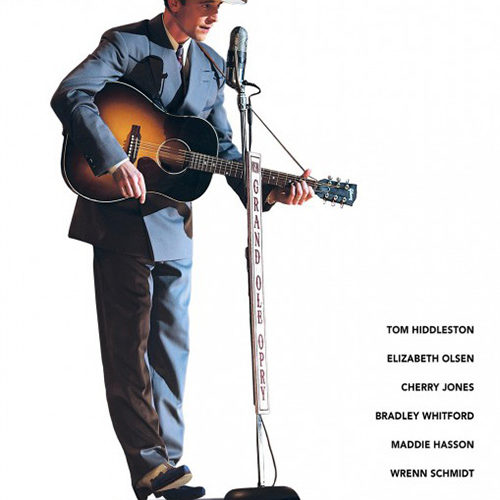The opening to Marc Abraham‘s I Saw the Light holds a lot of intrigue. Based on Colin Escott‘s biography about hillbilly legend Hank Williams, the start goes from a faux black and white newsreel interview with producer Fred Rose (Bradley Whitford) recounting how one-of-a-kind the singer was to a magically lit performance by Tom Hiddleston as Williams (the actor sings every note and the actors playing his band pluck every string). He’s sitting on a stool with a hazy spotlight pouring down, his chiaroscuro silhouette against the darkened audience foreshadowing the drama to come. It had me preparing for something truly special, but sadly the film proved familiar instead.
It’s a tough genre to really win me over, though, despite the movie being extremely well made and Hiddleston, et al magnificent in their roles. I can’t even say it deals with too much of his life either considering his music career and fame only lasted six years, but it feels much longer sitting through it. A lot of this stems from Williams’ life being a clichéd one, charmed by success and tainted by drunken volatility and rampant philandering. We’ve seen it before with countless other musicians to the point where I’d probably call the first biopic about an artist who never cheated and who adored his fans a masterpiece — it’s too bad a story like that is rarer than a unicorn and its marketability even more so.

You need conflict and Williams had it in spades. He married his wife Audrey (Elisabeth Olsen) ten days after her first divorce; his mother (Cherry Jones) performed managerial duties with an iron fist of love; and the drive to play the Opry led to constant travel, perpetually failing those back home. His talent was undeniable with my recognizing almost every single song played despite being clueless to the fact they were his. He had internal demons, a debilitating disease (besides alcoholism), and did attempt to do better for wife and son. But happily ever after and musicians don’t generally coexist. Williams is hardly an exception.
The interview vignettes with Rose and others continue as a sort of precursor to each jump in time, but I’m not sure they add much to the story. Seeing Williams alternately kind and mean is all we need to understand his damaged heart. His temperament comes with a short fuse towards those he finds himself beholden to through contracts and commitments—perhaps even towards Audrey if we believe the comedic readings of divorce papers. Abraham never shows him hit her — or anyone else for that matter, besides an incident where he’s jumped onstage. It really was about the music and sometimes his lyrics hurt more than a fist ever could.
There are some really interesting moments but many are discarded for the next chapter. I thought the relationship to his backing band was one of the more captivating aspects as there was an undeniable closeness despite powers that be forcing Hank to work with studio groups instead. His dynamic with these hired hands showed a real conflict of interest but it’s never spoken of again. Periphery factors are often forgotten like this when something new looms on the horizon. Even Olsen (who is great, singing herself and supposedly badly for the character, although I couldn’t tell) disappears when the time comes for future love.

So much care is taken to tell us about Hank and Audrey’s union, though, that the brevity of the other two ends up rushed and almost a complete afterthought. Wrenn Schmidt’s Bobbie is great and equal to the task playing minx and jilted, but Maddie Hasson‘s Billie Jean’s blank-faced indifference had me wondering why Hank wanted her at all. The second act is pretty much setting him up for his fall and they are a big part of it, but it’s dull without any truly happy times or past joy before wealth struck. Or maybe the charisma (love and hate) of Hiddleston and Olsen was too good for the rest to compete. A lot of the spark is removed at the same time she is.
The extended musical performances showcase Hiddleston’s chops, but the script can’t provide enough assistance for us to care. He embodies Williams and the singer/songwriter’s story is up on screen, but I can’t say I remained interested beyond his transformation. Hank’s life was tragic and he is famous enough to warrant a quality production like Abraham supplies, but it feels very “generic rocker takes a fall.” A checklist is marked, a legend immortalized, and I’m left shrugging my shoulders. There’s no hook besides its naturalism and that doesn’t cut it in a post-Behind the Music world.
I Saw the Light premiered at TIFF and will be released on March 25th.


